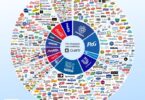More studies continue to be published warning about the dangers of plastic residue in American food and beverages, the latest being a series of investigative reports and studies published by Consumer Reports so far this year.
First published on January 4th, and updated on February 8th, CR tested a hundred popular food items for plasticizers, and found “that despite growing evidence of potential health threats, bisphenols and phthalates remain widespread in our food.”
The study looked at “prepared meals, fruits and vegetables, milk and other dairy products, baby food, fast food, meat, and seafood, all packaged in cans, pouches, foil, or other material,” including some organic ones as well.
SEE: Microplastics In Packaging Found In Human Heart Tissues For First Time
Specifically, the analysis looked for bisphenols and phthalates that leach into the food. CR wrote:
The findings on phthalates are particularly concerning: We found them in almost every food we tested, often at high levels. The levels did not depend on packaging type, and no one particular type of food—say, dairy products or prepared meals—was more likely than another to have them.
For example, we found high levels in, among other products, Del Monte sliced peaches, Chicken of the Sea pink salmon, Fairlife Core Power high-protein chocolate milkshakes, Yoplait Original French vanilla low-fat yogurt, and several fast foods, including Wendy’s crispy chicken nuggets, a Chipotle chicken burrito, and a Burger King Whopper with cheese. Organic products were just as problematic: In fact, the highest phthalate levels we found were in a can of Annie’s Organic cheesy ravioli.
The trouble is, there are so many ways these chemicals enter our food.
Early efforts to limit exposure to them focused on packaging, but it’s now clear that phthalates in particular can also get in from the plastic in the tubing, conveyor belts, and gloves used during food processing, and can even enter directly into meat and produce via contaminated water and soil.
There are few regulations restricting the use of these chemicals in food production, or requiring that manufacturers test foods for them.
A collection of the top food items with the highest level of phthalates in them are as follows (in order of phthalates by nanogram per serving):
- Beverages: Brisk Iced Tea Lemon, Coca-Cola Original, Lipton Diet Green Tea Citrus, and Poland Spring 100 percent natural spring water.
- Canned Beans: Hormel Chili with Beans, Bush’s Chili Red Beans Mild Chili Sauce, and Great Value (Walmart) Baked Beans Original.
- Condiments: Mrs. Butterworth’s Syrup Original and Hunt’s Tomato Ketchup.
- Dairy: Fairlife Core Power High Protein Milk Shake Chocolate, SlimFast High Protein Meal Replacement Shake Creamy Chocolate, Yoplait Original Low Fat Yogurt, and Tuscan Dairy Farms Whole Milk.
- Fast Food: Wendy’s Crispy Chicken Nuggets, Moe’s Southwest Grill Chicken Burrito, Chipotle Chicken Burrito, Burger King Whopper With Cheese, Burger King Chicken Nuggets, and Wendy’s Dave’s Single With Cheese.
- Grains: General Mills Cheerios Original and Success 10 Minute Boil-in-Bag White Rice.
- Infant Food: Gerber Mealtime for Baby Harvest Turkey Dinner, Similac Advance Infant Milk-Based Powder Formula, Beech-Nut Fruities Pouch Pear, Banana & Raspberries, and Gerber Cereal for Baby Rice.
- Meat and Poultry: Perdue Ground Chicken Breast, Trader Joe’s Ground Pork 80% Lean 20% Fat, Premio Foods Sweet Italian Sausage, and Libby’s Corned Beef.
- Packaged Fruits and Vegetables: Del Monte Sliced Peaches in 100% Fruit Juice, Green Giant Cream Style Sweet Corn, and Del Monte Fresh Cut Italian Green Beans.
- Prepared Meals: Annie’s Organic Cheesy Ravioli, Chef Boyardee Beefaroni Pasta in Tomato and Meat Sauce, Banquet Chicken Pot Pie, Campbell’s Chunky Classic Chicken Noodle Soup, and Chef Boyardee Big Bowl Beefaroni Pasta in Meat Sauce.
- Seafood: Chicken of the Sea Pink Salmon in Water Skinless Boneless, King Oscar Wild Caught Sardines in Extra Virgin Olive Oil, and Snow’s Chopped Clams.
When people use them, when they heat them in the microwave or put the rubber duckie in the bath and it gets warm, these chemicals can get out and into people.
Philip Landrigan, MD, a pediatrician and epidemiologist and director of the Boston College Program for Global Public Health and the Common Good
The doctor also noted that these substances found in plastic “include carcinogens, neurotoxic chemicals, and endocrine-disrupting chemicals.”
CR, citing Landrigan, additionally noted:
Some of these chemicals can directly damage organs, leading to disease over time. Others interrupt important biological processes, often involving hormones.
This happens because some of the chemicals in plastic can affect the same biological receptors that hormones do in our bodies. Some of the health issues that could be triggered by chemicals in plastic include low birth weights and preterm births, impaired fertility, maternal breast cancer risk, and problems with brain development in young children.
These types of chemicals—known as endocrine disrupters—have also changed old ideas about how the dose makes the poison. While that’s true for certain types of toxins, compounds that disrupt the endocrine system, such as bisphenols and phthalates, can have long-lasting effects on health even at low doses.
Exposure to endocrine disrupters can increase the risk of obesity, metabolic disorders like diabetes, neurodevelopmental problems, and reproductive issues. Pregnant people and their children are most susceptible to these effects, Landrigan says. That’s because babies and young children are extremely vulnerable to small changes in hormone levels as they are developing. For example, if thyroid hormone levels are disrupted in a pregnant person, that can affect crucial stages of brain development.
But trying to reduce these bleaching of plastic substances from food and drink is a tall order that very few, so it appears, even want to bother with trying to make meaningful changes to, especially since there is very little regulation. Hanno Erythropel, PhD, at the Center for Green Chemistry and Green Engineering at Yale University in New Haven, Connecticut, said, “We want things to be functional, but also nontoxic and biodegradable and renewable.”
In the meantime there are still some ways to at least reduce absorption of these plasticizers, according to CR:
- Avoid plastic food storage containers
- Steer clear of fast foods
- Limit high-fat foods
- Eat fresh, minimally processed food
- Choose wood, stainless steel, and silicone for kitchen tools
- Use water bottles made of glass or steel
- Go fragrance-free
- Open your windows – (phthalates from furniture, flooring, etc. can accumulate from the dust)
- Refuse paper receipts
- Limit your use of vinyl
Read more about it here.
Consumer Reports has been one of the few semi-mainstream publications that have been exposing the effects of plasticizers and food contamination for decades.
AUTHOR COMMENTARY
Beloved, I wish above all things that thou mayest prosper and be in health, even as thy soul prospereth.
3 John 2
In this day and age avoiding plastics is nearly impossible, and so your best bet is to try and minimize your use of anything with plastics, specifically when it comes to cooking and bathing.
Pretty much all of these foods listed I would not eat anyways nor have I in such a longtime. Though organic is certainly not exempt, it is still overall much better than the conventional slop that is called “food,” that is normally banned in most countries around the world for a reason.
SEE: Shock Study Reveals Bottled Water Contains An Average Of 240,000 Pieces Of Nanoplastics
[7] Who goeth a warfare any time at his own charges? who planteth a vineyard, and eateth not of the fruit thereof? or who feedeth a flock, and eateth not of the milk of the flock? [8] Say I these things as a man? or saith not the law the same also? [9] For it is written in the law of Moses, Thou shalt not muzzle the mouth of the ox that treadeth out the corn. Doth God take care for oxen? [10] Or saith he it altogether for our sakes? For our sakes, no doubt, this is written: that he that ploweth should plow in hope; and that he that thresheth in hope should be partaker of his hope. (1 Corinthians 9:7-10).
The WinePress needs your support! If God has laid it on your heart to want to contribute, please prayerfully consider donating to this ministry. If you cannot gift a monetary donation, then please donate your fervent prayers to keep this ministry going! Thank you and may God bless you.







